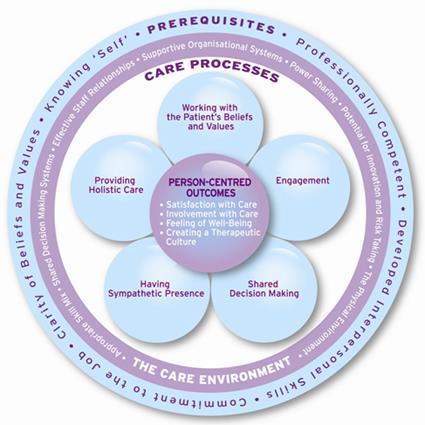Nusing Discussion Week 2
Introduction

Caring is a central concept to nursing and has been since the beginning of the profession. Over time, healthcare delivery and settings have changed as a result of technological and knowledge advancements, an increasingly diverse patient population, a shifting focus to decreased healthcare costs, increased quality and safety outcomes, and promoting person-centered care, among other factors. With these changes, a transformation of nursing is occurring. However, nurses must be mindful not to lose sight of caring at the core of nursing practice. Caring frameworks that include holistic and person-centered care can be used to guide the practice of the master's- prepared nurses in advanced practice roles as leaders of nursing care in varied healthcare settings.
Caring as a Nursing Concept
Caring can be classified in two ways: as a noun and as an adjective (Adams, 2016). As a noun, it is the act of care, or as an adjective, it is the demonstration or action of caring. Nursing has a scientific knowledge base of empirical care practices and personal, ethical, and aesthetic knowledge that are demonstrated in attitudes and behaviors that portray caring. Drahošová and Jarošová (2016) discussed many aspects of caring, including protection and support of patients through evidence-based interventions, developing relationships, and a way of nursing practice. Caring is influenced by the nurse's knowledge, skills, and attitudes formed through lifelong learning and experiences.
The concept of caring has been a focus area of nursing for years. Interestingly, the American Nurses Association (2016) defines nursing as:
...the protection, promotion, and optimization of health and abilities, prevention of illness and injury, facilitation of healing, alleviation of suffering through the diagnosis and treatment of human response, and advocacy in the care of individuals, families, groups, communities, and populations.
The concept of caring is not explicit in this definition, so why is caring a central focus of nursing? Nursing theorist Jean Watson contended that caring is the moral ideal and essence of nursing (Watson, 1990). Adams and Maykut (2015) acknowledged nursing as a helping profession, and therefore, caring is a unique and relational practice of nurses. Similarly, Duffy (2015) defines caring as a series of kind acts and an attitude in addition to collective values and knowledge-based actions that are guided by human-to-human relationships.
Caring is manifested in relationships. As a master's- prepared advanced practice nurse you will have daily opportunities to demonstrate caring behaviors that establish relationships and promote positive outcomes in varied professional practice settings. Drahošová and Jarošová (2016) identified caring behaviors as attentiveness to patients; communicating openly and honestly ; providing dignity, respect, and comfort; and connecting with patients and families.
Reflection
Take a moment to reflect on how you demonstrate caring in your current professional practice. What are barriers to practicing care? How can you enhance caring behaviors?
Caring in Complex Systems
Over time, healthcare systems have increased in complexity in part due to technological advances and increased knowledge and skills. Focus on quality, safe, and cost- effective care is paramount to the 21st-century healthcare delivery system. These changes in the healthcare environment have led to an expanded professional role of the nurse that includes a focus on institutional and/or organizational and professional regulation and compliance and technology -driven tasks, all which shift focus and time from the patient care experience and the fundamental nursing principle of caring.
Another change in the delivery of healthcare is driven by people becoming more involved in making decisions regarding their health and health practices. People are now actively participating in their own care. This change is shifting the focus from provider-driven care to person-centered care. "The current focus on person-centeredness in practice illustrates society's drive to redress the current imbalance in care, moving away from an ethos that is medically dominated, disease orientated, and often fragmented toward one that is relationship focused, collaborative, and holistic" (McCance, McCormack, & Dewing, 2011, para 8). All of these changes contribute to the increasing complexity of the healthcare environment and shape the role of master's- prepared advanced practice nurses.
Holistic Nursing Practice
Nurses in all settings are tasked with providing care in a caring manner with attention to all aspects of the person, health, and environment. A holistic approach to care is recommended for master's- prepared nurses in advanced practice roles (Papathanasiou, Sklavou, & Kourkouta, 2013) who are instrumental in implementing and evaluating person-centered care and care environments. Although nurses must certainly be knowledgeable about how disease physiologically affects the patient; it is important to care for the whole person and not just a diagnosis or piece of equipment. Holistic care expands beyond the physiological aspects of health (illness and/or disease) and incorporates additional psychological, sociological, developmental, spiritual, and cultural aspects. Also, included in holistic care are environmental and economic factors.
Reflection
Consider ways in which you incorporate holistic care principles in your professional practice.
Holism is more than certain actions performed or words spoken to a patient. Holistic care is a philosophy; it's a method to ensure care for all parts of the patient. Holistic nurses are those who recognize and treat each individual as a unique human being connected to family and community (Papathanasiou, Sklavou, & Kourkouta, 2013). Holism represents an ability of the nurse to work with the healthcare team and available resources to promote optimal health outcomes with the person as the central focus. This also means recognizing that the nurses' relationships with patients will also grow and hopefully change into positive patterns of mutual trust and caring interactions. Holistic nursing moves the nurse mindset from linear, task-oriented practices to complex and multidimensional care in any healthcare setting. Holistic nursing also encourages nurses to integrate self-care, self-responsibility, spirituality, and reflection in their lives. Hence, holistic approaches to person-centered care leads to better outcomes of patient care and improved nurse satisfaction with their own professional endeavors.
Person-Centred Care Nursing Framework
Caring continues to be a central concept in nursing; however, the context for caring is transforming, resulting in conceptual and theoretical advancements related to the evolving healthcare practice settings. McCormack and McCance originally developed a Person-Centred Nursing (PCN) Framework in 2006 and updated it in 2010 that can be applied to practice in complex healthcare systems (McCormack & McCance, 2006; McCormack & McCance, 2017). The PCN Framework provides a standard of care for practice and is a multidimensional process that places emphasis on the person as the center of care delivery (McCance, McCormack, & Dewing, 2011). The PCN Framework fosters outcomes related to therapeutic relationships through respecting individuals as persons and partners in care. The Person-Centred Care Nursing Framework consists of four constructs: prerequisites, the care environment, person-centred processes, and outcomes (McCance et al., 2011). To deliver effective care, one must work from the outer circle first to the core.

Prerequisites focus on the attributes of the nurses and include being professionally competent, having developed interpersonal skills, being committed to the job, being able to demonstrate clarity of beliefs and values, and knowing self. The care environment focuses on the context in which care is delivered and includes appropriate skill mix, systems that facilitate shared decision making, effective staff relationships, organizational systems that are supportive, the sharing of power, the potential for innovation and risk taking, and the physical environment. Person-centred processes focus on delivering care through a range of activities and include working with a patient's beliefs and values to overcome this gap between the concept and the reality of person-centred care we have developed the Person-Centred Nursing Framework...engagement, having sympathetic presence, sharing decision making, and providing holistic care. Outcomes, the central component of the Framework, are the results of effective, person-centred nursing and include: satisfaction with care, involvement in care, feeling of well-being, and creating a therapeutic environment. (McCance, McCormack, & Dewing, 2011).
Reflection
Consider how the Person-Centred Care Framework can support quality and safety outcomes. Identify three ways in which you can use the Person-Centred Nursing Framework to improve outcomes in your future professional practice setting.
Conclusion
Nursing practice is both an art and a science with foundational knowledge, skills, and attitudes based in caring. Over time, the health care setting has changed and continues to increasingly evolve in complexity. The complexity of the current healthcare practice environment has led to conceptual and theoretical advancements that support nursing practices. Caring remains a central concept to nursing practice and the profession of nursing. This week's lesson included definitions of caring and an exploration of caring behaviors. Students were introduced to the Chamberlain College of Nursing care focus. Also emphasized in this lesson were principles of holistic nursing and the Person-Centred Nursing Framework as a model for practice. Students were encouraged to reflect on current nursing practices and implement a caring framework to guide future professional nursing practices.



